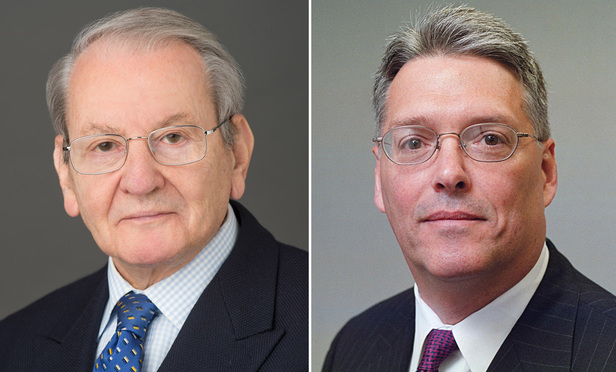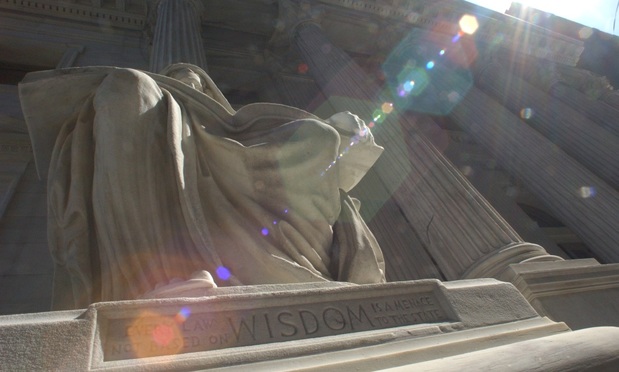Thomas R Newman

September 05, 2017 | New York Law Journal
SCOTUS Rejects Tactic Used to Secure Immediate Review of Class Cert. DenialsIn their Appellate Practice column, Thomas R. Newman and Steven J. Ahmuty Jr. discuss the U.S. Supreme Court's decision in 'Microsoft v. Baker', which resolved an important jurisdictional issue concerning class action procedure, holding that a federal court of appeals does not have jurisdiction under 28 U.S.C. §1291 to review an order denying class certification after the named plaintiffs voluntarily dismiss their individual claims with prejudice.
By Thomas R. Newman and Steven J. Ahmuty Jr.
22 minute read

July 03, 2017 | New York Law Journal
Pyrrhic Victories Are to Be AvoidedAppellate Practice columnists Thomas R. Newman and Steven J. Ahmuty Jr. use two recent cases to remind practitioners that it cannot be counted a victory if a favorable verdict is set aside by the trial or appellate court after a lengthy trial and the case must be retried at considerable expense, loss of time and renewed mental and emotional strain on the injured party or his or her survivors—all because of counsel's avoidable error.
By Thomas R. Newman and Steven J. Ahmuty Jr.
8 minute read

May 03, 2017 | New York Law Journal
Interest of Justice JurisdictionAppellate Practice columnists Thomas R. Newman and Steven J. Ahmuty Jr. write: As Justice Felix Frankfurter aptly observed, "Wisdom too often never comes, and so one ought not to reject it merely because it comes late." With certain limited exceptions, however, issues raised for the first time on appeal will not be considered as grounds for a reversal or modification.
By Thomas R. Newman and Steven J. Ahmuty Jr.
17 minute read

March 03, 2017 | New York Law Journal
Appellate Jurisdiction in the New York Court of AppealsThomas R. Newman and Steven J. Ahmuty Jr. write: In 'Hain v. Jamison', the Court of Appeals addressed two recurring jurisdictional issues in the context of summary judgment: the "finality" requirement and the availability of affirmative relief to an nonappealing party.
By Thomas R. Newman and Steven J. Ahmuty Jr.
21 minute read

January 03, 2017 | New York Law Journal
Appellate Review of Exercise of Discretion by Trial CourtIn their Appellate Practice column, Thomas R. Newman and Steven J. Ahmuty, Jr. discuss appellate review of the exercise of discretion by the trial court. While CPLR §5501, Scope of Review, states in subsection (c) that "The appellate division shall review questions of law and questions of fact on an appeal from a judgment or order," it does not mention that court's power to review an exercise of discretion by the trial court. Nevertheless, the Appellate Division unquestionably possesses all of the powers of the Supreme Court. Its authority "is as broad as that of the trial court," and one often sees an Appellate Division decision and order (one paper) reversing or modifying an order or judgment of the Supreme Court "on the law, the facts and in the exercise of discretion."
By Thomas R. Newman and Steven J. Ahmuty, Jr.
24 minute read

November 01, 2016 | New York Law Journal
Motions for Permission to Appeal to the Court of AppealsAppellate Practice Columnists Thomas R. Newman and Steven J. Ahmuty, Jr. discuss filing a motion for permission to appeal to the Court of Appeals. Such motions, they point out, are rarely granted. The Court of Appeals exclusively focuses on cases that present legal issues with broad precedential significance. The main objective is to persuade the court that the case presents questions of law that are "leaveworthy," i.e., sufficiently important to merit review, not simply to demonstrate that the Appellate Division's decision was erroneous.
By Thomas R. Newman and Steven J. Ahmuty, Jr.
18 minute read

September 06, 2016 | New York Law Journal
Successive Appeals Presenting the Same IssueIn their Appellate Practice column, Thomas R. Newman and Steven J. Ahmuty, Jr. review a recent decision that brings an important reprieve to any would be appellant whose prior appeal has been dismissed as untimely, provided a subsequent judgment or order raising the same issues is entered from which a separate timely appeal may be taken.
By Thomas R. Newman and Steven J. Ahmuty, Jr.
15 minute read

July 06, 2016 | New York Law Journal
Permissible Appellants—Aggrieved PartiesIn their Appellate Practice column, Thomas R. Newman and Steven J. Ahmuty Jr. discuss the sometimes overlooked limitation on the very liberal right to appeal—the requirement that only an "aggrieved party or a person substituted for him [or her] may appeal from an appealable judgment or order except one entered upon the default of the aggrieved party."
By Thomas R. Newman and Steven J. Ahmuty Jr.
18 minute read

May 24, 2016 | New York Law Journal
Pleasures of Practice Other Than ProfitsFirm leaders would do well to heed the words of one of our greatest judges, Learned Hand, who said, "while I should be the last to say that the making of a profit was not in itself a pleasure, I hope I should also be one of those to agree there were other pleasures than making a profit."
By Thomas R. Newman
2 minute read

May 04, 2016 | New York Law Journal
Federal Appellate Review of Arbitration AwardsIn their Appellate Practice column, Thomas R. Newman and Steven J. Ahmuty, Jr. write that the Second Circuit's decision instructing the district court to confirm an arbitration award suspending New England Patriots quarterback Tom Brady for four games serves as a reminder of the very limited scope of judicial review of arbitration awards.
By Thomas R. Newman and Steven J. Ahmuty, Jr.
21 minute read
Trending Stories
- 1The Pusillanimous Press
- 2Contract Lifecycle Management Company ContractPodAi Unveils Leah Drive
- 3'Great News' for Businesses? Judge Halts Transparency Mandate
- 4Consilio Announces ‘Native AI Review,’ Expanding Its Gen AI E-Discovery Offerings
- 5Federal Judge Hits US With $227,000 Sanction for Discovery Misconduct
More from ALM
- Legal Speak at General Counsel Conference East 2024: Match Group's Katie Dugan & Herrick's Carol Goodman 1 minute read
- Legal Speak at General Counsel Conference East 2024: Eric Wall, Executive VP, Syllo 1 minute read
- Legal Speak at General Counsel Conference East 2024: Virginia Griffith, Director of Business Development at OutsideGC 1 minute read



